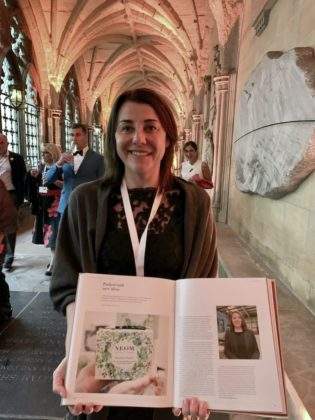Robinson partners with The History of Parliament Trust

Robinson partners with The History of Parliament Trust to celebrate 300 years of Leadership and Innovation
Chesterfield, UK – September 2021 – Robinson – the manufacturer specialising in value-added custom packaging – is the proud partner of a new publication to celebrate the best of British leadership, launched this week with The History of Parliament Trust at Westminster Abbey.
Robinson was selected to feature by The History of Parliament Trust – one of the most respected and authoritative research projects in British history. Entitled ‘300 Years of Leadership and Innovation’ the book is produced in partnership with leading publisher St James’s House and written by an editorial team of distinguished academics and award-winning authors. The beautifully designed, fully illustrated, 600-page hardback publication is being launched to coincide with the 300th anniversary of the appointment of Britain’s first prime minister, Robert Walpole, in 1721, and in the year of Her Majesty the Queen’s 95th birthday.
The book is presented in two volumes with expertly written articles on those who have shaped British society, past and present: from Walpole to Cromwell, Churchill to Blair, The Queen and Prince Charles to captains of industry and those pushing the boundaries of innovation.
The team at Robinson were interviewed for their article, which is included in the second volume dedicated to organisations leading in sustainability.
CEO Dr Helene Roberts says:
“At a time when many businesses are seeking to align themselves with sustainable values, Robinson is a rare example of a company that has such principles embedded into its behaviour from the very beginning. The business was founded in 1839 by John Bradbury Robinson to create boxes for medical supplies, such as pills and ointments, but Robinson was equally concerned with employee welfare. He bought sports grounds for his staff and the local town of Chesterfield, created pension schemes, and provided access to fair pay, housing and health care.”
That longstanding approach has stood Robinson in good stead as time has progressed. The company now develops a range of plastic and paperboard packaging for the food, homecare, personal care & beauty and luxury gift markets. Through all this change, the company continues to collaborate with the community, working with local schools and colleges to develop apprentices with the specialist technical skills, also engaging with the wider population about the importance of sustainability and circular economy.
Dr Roberts continues: “We work with the local economy and waste-management companies to source recycled plastics and paperboard to use in our packaging. Here the size of the company is very helpful. As a small business, Robinson maintains speed of execution and is a provoker of change, so while big businesses can do the research, we are more responsive and agile enough to integrate new technologies into existing processes. Businesses like ours have a great advantage as our agility and impact of change is nothing like the impact of change in a big business.”
“What sets us apart is how we do business,” says Dr Roberts. “We go above and beyond, whether it’s the way we treat our staff or how we service our customers. We have combined that original mindset with the speed with which we can operate and how we collaborate – that drives our behaviour and explains our success.”
Group Sustainability & Marketing Director, Lubna Edwards, adds:
“In addition to social responsibility, protecting the environment is a major driver for the business. Much of Robinson’s packaging portfolio is made from recycled plastic or recycled paperboard and is recyclable. Driving a circular, sustainable supply chain of materials and packaging is core to us. We want to get to a point where we don’t use any new resources. We introduced recycled material long before it was popular to do so and that creates a stable end-market for all the packaging material that people put in their recycling bin. We believe it can be done at all levels when we are creative and collaborative.”
